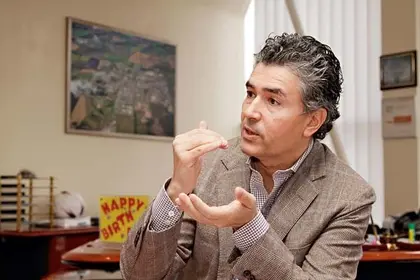Didier Casimiro
JOIN US ON TELEGRAM
Follow our coverage of the war on the @Kyivpost_official.
Nationality: Belgium-born Portuguese.
Age:44.
Position: General Director of TNK-BP in Ukraine.
Length of time in Ukraine: Almost two years.
Tips for succeeding in Ukraine:“Patience is not enough. You can have that and not become successful. What is necessary is what the Dutch call gedrevenheit – it’s like drive, but not the type of drive that is easily upset. Sustainable drive.”
By the end of September, Didier Casimiro was already celebrating $17 million in profits for TNK-BP Ukraine, where he is general director, and hoping for more before the end of the year.
That’s a sharp turnaround from 2010, when prospects looked much bleaker, with a $68 million loss and talk that the company’s flagship plant, the Lysychansk oil refinery in Luhansk Oblast, may have to be mothballed.
The company – the Ukrainian arm of the British-Russian joint venture – had a number of competitive disadvantages compared to some peers.
One of them, for example, was inability to access government-run domestic oil auctions that sold crude below the market price. Casimiro says access to the auction was limited to one company that belongs to Igor Kolomoisky, a billionaire co-owner of Privat Group.
Kolomoisky’s companies have 25 percent of the market share, while Lysychansk has about a 23-percent share.
Other issues were related with value-added tax and excise payments on import of crude and gasoline, wholesale price fixing by the government and other peculiarities that distorted the market in favor of individual players, including foreign ones.
Had things continued that way, eventually the company would have faced the need to close down or mothball the loss-making Lysychansk refinery.
Yet Casimiro decided on a two-way strategy: on one hand, he revisited the cost structure of his own business while lobbying – along with other market players – to introduce cleaner rules of the game for the whole sector.
At the same time, he picked a new business model for Lysychansk, using its capacity to refine oil from Russia for a fee. “The domestic margin of the refinery is negative, but if you can supplement that by volumes that are tolled back to Russia and receive a service fee [for refining], you have increased the utilization of your refinery, achieve better contribution to your fixed costs et cetera,” he says.

TNK-BP’s flagship plant in Ukraine is the Lysychansk oil refinery in Luhansk Oblast (Courtesy)
As a result, 82 percent of the 5 million tons of crude refined at Lysychansk currently goes back to Russia, while the rest feeds TNK-BP’s domestic network of 150 gas stations and 250 franchises.
The domestic refining margins at times can run to a loss of $50 dollars per ton of crude throughout the industry, Casimiro says.
He says agility is key to having a successful business in Ukraine.
“You need to be able not to dissolve in the minutiae of working in a difficult environment, to keep your company agile and flexible, but within the norms of Western-style corporate governance,” he says.
He says that the need to bring to Ukraine those Western-style rules is what pushed him to give an emotional speech in Brussels at the end of last month, urging the Europeans to “decouple” the free trade agreement and the association agreement, to be able to sign the former by the end of this year.
This is an idea that was heavily entertained by the government for most of this year, but Casimiro says he does not mind being in the same camp on this issue – he believes in change through participation.
“The investment climate here has to change for better,” he says, adding that Western rules could drive the change.
Kyiv Post editor Katya Gorchinskaya can be reached at [email protected]
You can also highlight the text and press Ctrl + Enter




